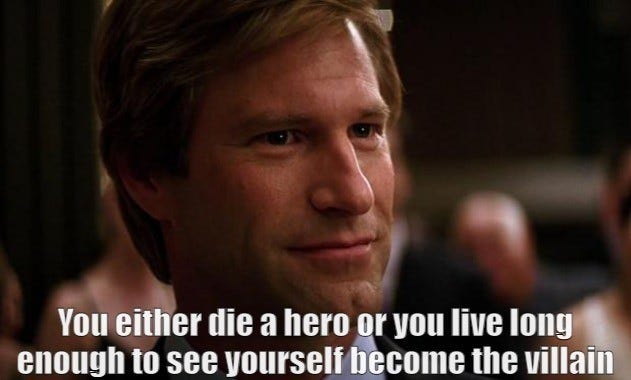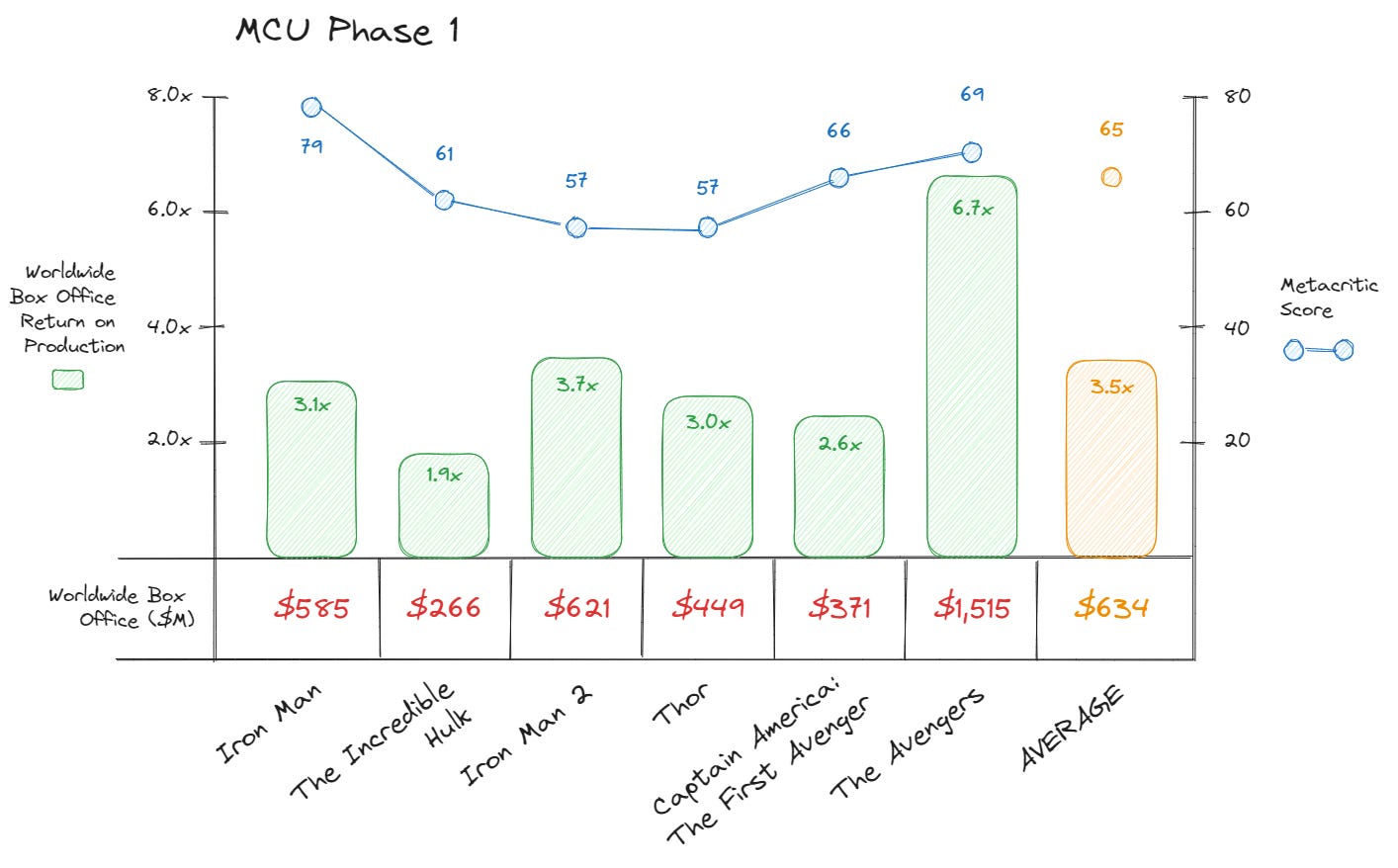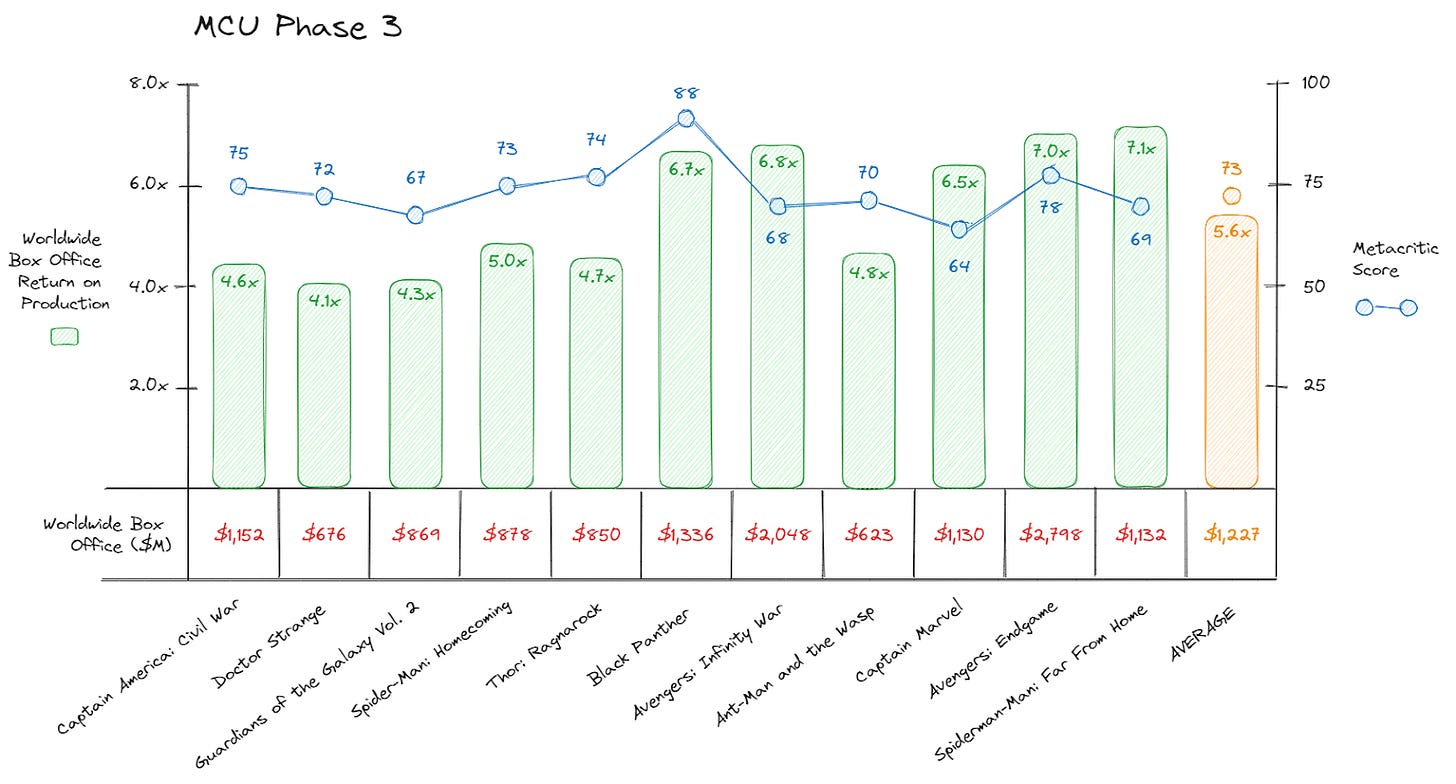Superhero Fatigue: Is it real, is it a blessing?
What can be done to combat superhero story stagnation
As Harvey Dent mused in The Dark Knight, even the best of intentions can be corrupted. Perhaps Two-Face was being prophetic about the risk of superhero fatigue when he issued his famous binary: “You either die a hero or you live long enough to see yourself become the villain”.
You’ve heard the criticisms and its ubiquitous name - superhero fatigue. Due to the explosion of superhero blockbusters since the early 2000s, the superhero genre has become oversaturated, repetitive, formulaic, and general audiences are exhausted and ultimately may lose interest in the genre entirely… And the studios aren’t stopping anytime soon [feel free to read a recap with my previous posts - Marvel vs. DC - Cinematic Strategy (Part 1) and (Part 2)]. Not only have the biggest franchises pledged multi-year roadmaps, but other studios have gotten into the superhero business too - Netflix and Amazon: Comic Book Adaptations.
Mythology is sustained by its followers, in the superhero case the engagement from audiences. Superhero fatigue puts these stories and characters at risk of becoming irrelevant. The narrative degradation could cause superhero media to become a caricature of itself, ruining the themes of heroism, morality, and fantasy that captivated fans into the genre to begin with. In the worst case scenario that mythology could cease to exist. Luckily we’re not at that point for our superhero stories yet, but recognizing the risk is the first step to addressing it. So how “real” is superhero fatigue? And what can be done about it? Let’s start with the data.
Box Office Data
As mentioned, there have been a lot of superhero movies since the early 2000s (which could be part of the problem), but I’m going to examine a cross section of the genre to derive some insights. In particular, the focus will start with the Marvel Cinematic Universe (MCU). It is arguably the advent of the MCU that kicked off the superhero renaissance, and the connected cinematic universe of the MCU is cited as the catalyst for superhero fatigue because its high volume episodic nature compelled audiences to watch every entry. But how much truth is there that superhero fatigue is caused by the MCU or affecting it?
The framework I created utilizes three data points1 to measure economic success, audience success, and quality which I outline below. I believe the combination of these dimensions are what make franchises take notice of the effectiveness of their strategy.
Worldwide Box Office - The amount of money the movie makes from box office revenue globally. This is not only a measure of economic success, but also a proxy for audience success.
Worldwide Box Office Return on Production - The return on investment the movie makes from the gross box office revenue divided by the production budget. This is another measure of economic success. A movie can make alot of revenue, but can it cover its costs?
This does not take into account marketing spend as that data is challenging to source for every movie, and marketing budget is more discretionary than production costs.
Metacritic Score - This is a measure of the quality of the movie, which does bear a relationship to audience success. I prefer using Metacritic over Rotten Tomatoes, because Rotten Tomatoes measure the percentage of positive reviews, and Metacritic’s methodology measures the average of all reviews.
To keep this simple, the movies will be the main focus for now. Let’s start with the MCU’s Phase 1. As you can see below Phase 1 averaged $634M, a return of 3.5x, and an average critic score of 65 / 100, across its first six movies. I would call this a success, a 3.5x ROI is not only good for movies, but most any type of investment. Phase 1 had its ups and downs economically and critically, but overall has resonated with audiences and was the beginning of a blockbuster paradigm shift.
As we move onto MCU Phase 2, coincidentally the average critical score was also 65, but these six movies averaged much higher box office success than Phase 1.
With MCU Phase 3, the momentum kept rolling. The third phase outperformed the previous two in each of the three categories with almost as many movies (eleven to twelve). So at this point in time, at least with the MCU, if there was superhero fatigue, there was also some form of cognitive dissonance with audiences, because they didn’t seem to mind.
The first three phases of the MCU is called the Infinity Saga, and as it came to its conclusion the world has never seen a feat achieved by Marvel. A multi-billion dollar connected media universe that had audiences and critics flocking to see the next addition to its narrative.
The following three phases (4, 5, 6) and grand experiment by Marvel is titled the Multiverse Saga. To date, Phase 4 has been concluded and it comprises seven movies, and we are two movies into Phase 5. I grouped them together below for simplicity2. Phase 4 and 5 also include TV series, but I’m keeping the focus on box office data to streamline the analysis and because streaming return is quantified.
It is important to note that Phase 4 was also during the Covid-19 pandemic which significantly affected movie attendance. With that caveat in place, the latest crop of MCU movies actually perform better from a gross box office revenue and return than Phase 1, but only that phase, and on average are critically scored the lowest among all the MCU phases. In fact, one of the latest movies - Ant-Man and the Wasp: Quantumania - is the lowest scoring movie in the MCU. This is where the criticism of superhero fatigue begins to be validated. By the metrics I’ve outlined, the quality is noticeably decreasing for the MCU movies, and the box office performance is also starting to degrade. The latter of which I’m sure the studio is starting to take notice of, although I hope they’ve taken notice of the former.
The table below summarizes the averages of the MCU phases, and I’ll also add in the averages for the DC Extended Universe (DCEU) movies before Warner Bros. Discovery’s planned revitalization of the DCEU into the DC Universe (DCU) under James Gunn and Peter Safran.
Another tenant of superhero fatigue frequently cited by proponents is the volume of superhero media content occurring is overwhelming. There’s truth to that as well because while the MCU is unfolding, the DCEU competed in parallel. I won’t go through the entire exercise above to lay out the data for each DCEU movie, because honestly it’s just a significantly worse version of the MCU by these metrics as indicated by the averages. So from a movie perspective, audiences are facing declining ratings by the MCU which is pumping out content at a higher rate, while also being exposed to the DCEU collection of lesser rated movies.
This table alone is fifteen years of movies where the quality has been at risk. I haven’t even included the full proliferation of superhero media in this analysis, for example the Marvel Disney+ and DC Max streaming shows, the CW TV series derived from the Green Arrow show nicknamed the Arrowverse, non-DC or non-Marvel shows and movies like the comic book adaptations by Netflix and Amazon, and more.
Is superhero fatigue real? From the data it’s starting to be. However, the superhero industry isn’t at the point of no return yet. This should be a clarion call to all that venture into the superhero and comic book genre that change needs to occur.
Wake-Up Call
It’s understandable why fans have been inundated with superhero movies and TV shows for several years now. Studios are trying to ride a tailwind started by Marvel, be best in class in the genre, and as long as their properties are producing a positive ROI, studios aren’t incentivized to stop. As noted previously, this heightened frequency is starting to produce diminishing returns both economically and on quality, and the two are inextricably linked.
One stark reason for that is the volume of content studios put out can be taxing to the resources and capabilities needed to produce them, or at least produce them at a high quality. In the MCU Phase 1, Marvel put out 1.5 properties / year (six movies over four years), whereas in the latest Phase 4 and 5, to date there have been 8.5 properties / year (nine movies and eight TV series over two years). Companies do increase the amount of resources and capabilities over time to meet their goals, but it’s never perfectly balanced, as all things should be. In fact, there have been numerous reports of Marvel’s VFX department speaking out on how the team has been stretched far beyond their means and the end product is being severely affected - [CNET] Marvel's VFX Artists Are Suffering -- and Starting to Speak Out (August 2022) and [IndieWire] Marvel VFX Artists Allege ‘Tension, Turmoil’ on ‘Quantumania’: ‘I Equate It to Human Greed’ (February 2023). This practice is highly inequitable to the teams that are being stressed which fatigues a companies’ resources, and in turn degrades the results for inducing a form of fatigue for audiences.
Studios have taken notice and are starting to make corrections. Recently, Bob Iger, the CEO of Disney, made comments on reducing expenses and deemphasizing content volume as a strategy3.
[When asked about how much Disney spends on content and projects being pushed forward] - “It comes in the form of reducing the expense per content, whether it’s a TV series or a film, where costs have just skyrocketed in a huge way and not a supportable way in my opinion”
[Comments on how to make differentiated content] - “If you can be more curated, more — I used the word ‘judicious’ a few times — but I guess, more picky about what you’re making, and to concentrate on quality and not volume.”
Additionally, In James Gunn’s press conference to unveil the new DCU, he mentions their goal is to have two movies and two Max shows released per year4. It’s encouraging to see the prisoner’s dilemma of the content race being broken, and I also sincerely hope that these corrections result in the improvement of working conditions for the teams involved. Now that there is a recognition of quality over quantity, how do these companies improve their narratives?
One method is utilizing genre blending. You may recognize this already as some modern superhero movies and shows have incorporated elements of westerns, sitcoms, noirs, and others. The idea behind that is superhero narratives themselves are no longer just a singular genre, but they stretch across a range of genres, becoming their own storytelling mode. I cover this more extensively in Marvel vs. DC - Cinematic Strategy (Part 2), where I also cite comments by Kevin Feige, the showrunner of the MCU, that genre blending is a deliberate strategy employed by Marvel. I firmly believe all studios should keep pursuing this concept. If audiences believe superhero movies are formulaic then a way to address that is to broaden the scope of the superhero genre.
Another is the pursuit of narrative innovation. This is obviously much easier said than done because there is no exact blueprint. It involves experimenting with new ideas, fresh takes on existing ones, fostering a culture that nurtures creativity, and above all taking risks. When you do so, you get shows that shake up the status quo such as The Boys, Amazon’s subversive drama about a team of vigilantes who expose the corruption of superheroes who abuse their powers. This edgy show depicts a dystopian “supe” world that is a sociopolitical foil to modern society, and a shocking showcase of the super powered consequences on the human body. Or you can produce groundbreaking animated masterpieces like Spider-Man: Into the Spider-Verse, Sony’s multiversal story of Miles Morales becoming Spider-Man. A movie that enriches the diverse tapestry of the Spider-Man mythos through an inventive and kinetic style of animation. Comics have always been a testing ground for new fantastical ideas so comic book blockbusters should follow suit.
--
Not recognizing there is a problem, is part of the problem. Whether or not these companies are still in denial about superhero fatigue doesn’t change the fact that by their own doing the bar has been raised for the industry. Which is honestly a blessing because that is more reason to continuously innovate.
My plea to audiences, as these companies invent new ways to combat superhero fatigue, is open mindedness and patience. Experimentation carries risk to it, and while that is the cost of doing business, change is a two way street. My plea to the studios is to take the stewardship of the superhero mythology seriously, and not just chase a short term positive ROI. It is more prudent for longer term sustainable success to refocus on the narratives to ensure fans are not disillusioned.
Let’s hope the next great spectacle in the superhero genre is ushered in by this criticism, and I’ll certainly be there watching when it does.
The figures are pulled from The Numbers and Metacritic
At the time of posting, The box office run for Guardians of the Galaxy Vol. 3 has not concluded, so the data included are the most recent numbers









